

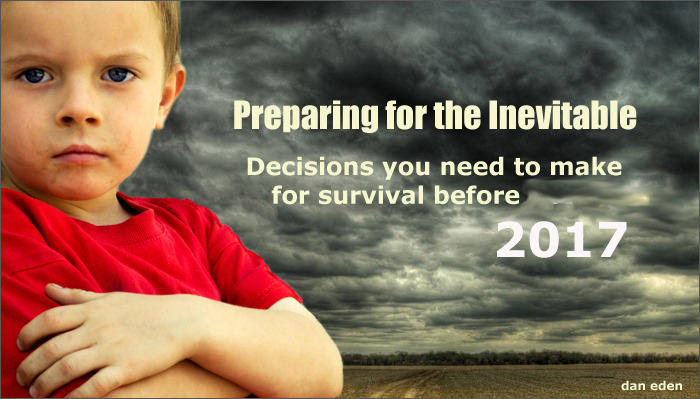
Preparing for the Inevitable
Part 2: Living Without Electricity || Part 3: Water, the Source of Life Part 4: Eating Dog Food? || Part 5: Money and Barter
 Money & Bartering When a disaster first happens, there is usually a rush to buy supplies that quickly empties most stores and supermarkets. Sometimes, because of the increased demand, prices soar as merchants take advantage of people's desperation. In hurricanes, for example, it is not unusual to see plywood sheets selling for a hundred bucks or fresh water fetching double the price of gasoline. If a natural disaster of any magnitude happens, the first thing to go is usually electricity. Roadways become impassible due to obstructions or heavy evacuation traffic making access to your cash, through an ATM or bank, impossible.
If you have ever visited a third world country you know that just about everything you want to buy is exactly one dollar. Coins are not used. The same thing will happen when you are shopping at the neighborhood markets that will inevitably appear after a disaster. Everything will be in even dollar amounts with little use for coins as no one will be collecting taxes. Your best strategy is to have a supply of one dollar bills for small items and one hundred dollar bills for the big things. Carry only what you intend to spend at any moment and don't flash it around. What about gold?
You can easily see that having gold is of little use in this kind of situation. In fact, gold rapidly loses it value in a long crisis because few people can successfully establish its market value and, as wars and famines have demonstrated, a starving man will pay a gold coin for a sandwich or a bowl of rice. In the economic crisis in Argentina, a blogger named "Ferfal" noted, however, that there were always some people in these ad hoc markets who would buy gold and exchange it for either cash or commodities at a substantially discounted rate. But instead of gold bars or coins, the ideal way to use gold was to exchange what is called "junk gold". Junk gold refers to small items such as gold rings, charms, jewelry and especially gold chains. The latter was especially handy because the weight of the links could easily be gaged by laying it on a scale and cutting the links when the desired weight value was achieved. Gold dealers are usually optimists, hoping that they will do well when the disaster is over and the exchange rate gets back to normal. It's a sign of the times when the media is ripe with commercials asking people to "turn your old gold into cash!" It's started already. Commodities Things take on new value during a crisis. One of the very real fears is that the value of currency could dramatically drop. Overnight, that hundred bucks you saved could only buy what ten bucks used to... So it is wise to hedge your survival with items that can easily be traded or bartered. Everything changes in emergency times. Some things that were valuable before, such as electric appliances or computers, drop their value like a brick when the electric grid shuts off. Other commodities, like fresh water in certain areas where there is none, become the equivalent of liquid gold. If you want to know what kinds of commodities will be in demand -- some good lessons can be gained by looking at the economy of prison culture.
But cartons of cigarettes are expensive as an investment. A better solution is to stock up on canned tobacco and cigarette papers. These keep longer and will be worth many times their purchase price in an emergency. Although smokers prefer their usual brand, rolling their own will suffice. Someone wrote to me and suggested salt as a valuable commodity. He said he was going to bury hundreds of pounds of salt in plastic bags. I thought this was odd until I did some research and found that salt is indeed something that has a high value in an emergency. Historically, humans have gone to war over salt. It's not only used to flavor food but it is a necessity of life and can be used to preserve food. Although it is cheap now, salt may indeed be on the top of the barter list in a disaster lasting many weeks or months. If we are following the prison economy we must consider drugs and alcohol here on our list of commodities. I would seriously avoid illegal drugs for many reasons. You put yourself in danger when you attempt any kind of barter with someone who is addicted and perhaps even high on drugs when you meet them. Medicine is one thing, but even dealing with marijuana can attract people who might feel that they have some right to steal from you or hurt you. After all, are you going to report them to the police? Now, alcohol... that's a different matter.
Of course, bullets are always going to be in demand. Heck, they are already scarce in some places. Ammo for shotguns is probably the best commodity, followed by .22 shells, then .38 and 9mm rounds. Boxes of 50 are the standard for the smaller rounds. You can often buy these at a discount if you buy "a brick" -- 500 shells -- at one time. Lastly, things like coffee and toilet paper may seem odd right now, but remember that frontal headache you sometimes get when you haven't had your daily joe? Forget about ground coffee beans because the coffee machines will be idle. Freeze dried coffee is the most efficient caffeine delivery system. And toilet paper? Remember those long lines in the Soviet Union, sometimes a half mile long... What are your options really -- your hand? The final items that people will want are tools. Eventually things will break and need to be fixed. Automotive problems, small generators and even carpentry needs will require that people have those pesky tools that they left back in their garage or cellar. You may not want to let these valuable items out of your hands so, instead of selling them, you might offer to "rent" the tools or even perform the repairs yourself. Selling your skills and talents is something that you should think about. What do you know how to do that other people will find valuable? What skills do others have that you need? Storing your valuables
If you are planning to store large quantities of stuff, you might consider buying used cargo containers and either burying them underground or hide them in a barn or garage. On a smaller scale, 10 or 15 gallon plastic containers will do the trick. They are durable, waterproof and can easily be dug up, opened and reburied. One thing NOT to store is gasoline, unless you have the correct storage tanks. I remember back in the 70s when the Iranians instituted their oil embargo to America, resulting in gas rationing and long lines at the pumps. Some people tried to hoard gasoline in their homes and on farms. Lot of times they used improvised containers and didn't have adequate ventilation. There were huge explosions and many deaths in the news almost daily. Keep enough gasoline in the approved containers for your own family to use. Enough said about that. One good piece of advice that was sent to me was this: don't start a barter business anywhere near your family residence. Keep your family space and your business space separate. The last thing you want is some needy people bothering you, your wife or kids in the middle of the night to get some booze or bullets. Let people know you don't have any commodities in your home, and don't keep any there. Also, when you do have your "store" you might want to have some type of security. Since the law enforcement will be busy with other matters, perhaps a large, strong person with a visible handgun or shotgun nearby will prevent any intimidation or theft. You can barter for this service also! Good advice. Other valuable items may depend on where you live. In cooler climates you may find that warm clothes, boots or gloves have some value. If you live near a lake or the ocean then fishing gear, hooks and line may be in demand. Small knives are always handy items to sell or trade. In hot climates maybe sunglasses or umbrellas will have increased value... be creative and try to imagine the possibilities.
 
Comments: Here are some additional items suggested in survivalblog.com: Mason jars -- cheap at roughly $1 a bottle in case quantities, these will always be of use for canning or for storage of dehydrated food (and, yes, there will be canning and dehydrating post-SHTF). Mason jar lids and rings -- self explanatory; no lids means no canning, and the lids are single-use items. Boxes of one dozen are usually price from $1.75-$2.50, but you can almost always find these on sale somewhere.
[LooK! Reusable mason jar lids at http://www.lehmans.com/store/Kitchen___Canning_and_Preserving___Canning_Helpers___Reusable_Canning_Jar_Lids___1141085?Args= ] 32 count Strike-anywhere matchbooks. I bought 120 boxes for $20. on eBay. Just $.17 per box. Fire is life. The boxes themselves fit nicely in the pocket, and are lightweight. So handy and useful. It's clear at first glance that they are genuine. For small trades, 2 or 3 individual matches may even be traded, if they are strike-anywhere matches. Otherwise, you'll need the box for striking. Candles. I bought 144 of the 15-hour unscented white Votive candles for $48, or just $.33 each, at Candledepot.com. I've seen 500 of the 6 hour candles for 20 cents each on eBay. In either case, these are much smaller and cheaper than the Nuwick 120 hour candles. (2 cents per hours versus 8 cents per hour). They fit nicely in your pocket, and are lightweight and durable. You get light, and can cook with them using several candles under a pan. Others will want them, when the grid goes down. If you're looking for a business after TSHTF, I saw a Votive candle maker on eBay for $1,500. Paul T. Great again! I just want to share something about bargaining, whether you are trying to establish a cash price for something or arranging quid pro quo work. There comes a point in the haggling where both parties have stated what they want, albeit there may be vast differences. It has been proven that when this point is reached, the party that speaks first is the one that will concede the most. The best thing to do when you have asked what you feel something is worth is to just shut up. There will be awkward silence and you will feel like you want to say something more about why you think your demands are reasonable etc. -- don't do it. Wait for the other person to speak first and you will get what you want. This is an old salesman's secret. Use it wisely. F.M.
Men have to shave, unless everyone after the poleshift is going to look like Biblical characters! hmmm... appropriate maybe... but if you want to maintain that clean face you will soon find that your bag of plastic disposable razors runs out -- probably after it has given you and your wife's legs cuts and nicks. So the deal is you can use a disposable razor sharpener (picture included) which will restore that blade to its like-new sharpness. Well, almost like new. The things work pretty good but only for a few cycles at which point the blades become too thin or worn away that they really don't hold a good edge. But it's good for extending their life, for sure. Actually most rzors can last for several weeks if you remember to dry them after you use them. Most of the damage to the blade's edge comes from corrosion when they are put away wet. Don't do that -- dry them with a towel and then put them somewhere dry -- not in the shower or the bathroom where the steam from water can cause decay. Enough said. Lehman
 
|
Editor/viewzone.com
myristicin@hotmail.com

This article shows you how to "read" the eyes of your lover, boss or politician. It's the same tried and tested method used by Homeland Security, the police and FBI.
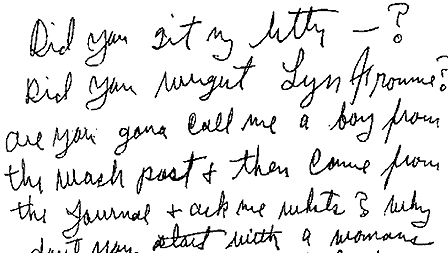
Learn everything about handwriting analysis in these free viewzone lesson by a professional!

Each person's fingerprint is unique. Exactly how do they match them so quickly?

What do your color preferences reveal about your hidden personality. See what advertisers and marketing professionals have known for decades.
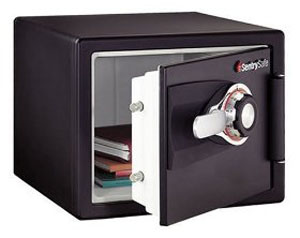 One of the easiest ways to avoid this crisis is to buy yourself a small but well made home safe, with a combination lock. A good safe costs less than a hundred bucks and is fireproof, large enough to hold your cash and other valuables and is heavy enough so that it will not easily be stolen or moved. You should keep most of your cash inside the safe in denominations of $100 bills, plus a few hundred dollars worth of smaller bills ($1 and $10).
One of the easiest ways to avoid this crisis is to buy yourself a small but well made home safe, with a combination lock. A good safe costs less than a hundred bucks and is fireproof, large enough to hold your cash and other valuables and is heavy enough so that it will not easily be stolen or moved. You should keep most of your cash inside the safe in denominations of $100 bills, plus a few hundred dollars worth of smaller bills ($1 and $10).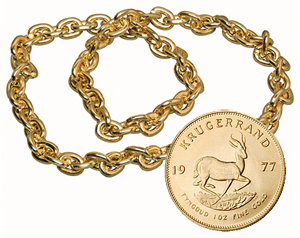 Imagine you are running a small variety store. Your food items have long been sold out, but you still have a supply of useful things like toilet paper, batteries, bug spray and automotive oil. A customer comes in with a gold Krugerrand -- what do you do? How much is it worth? Do you have enough change to give him?
Imagine you are running a small variety store. Your food items have long been sold out, but you still have a supply of useful things like toilet paper, batteries, bug spray and automotive oil. A customer comes in with a gold Krugerrand -- what do you do? How much is it worth? Do you have enough change to give him?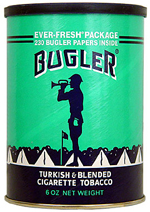 Cigarettes are something that some people must have. It's an addiction. Quite a few men and women smoke still and they will feel even more inclined with the additional stress. The produced standard is Marlboro in a hard box. Forget menthol or "lite" brands. We're talking about the most efficient nicotine delivery system. Cartons of Marlboros will be like bars of gold to a smoker who will crave a smoke even more than food.
Cigarettes are something that some people must have. It's an addiction. Quite a few men and women smoke still and they will feel even more inclined with the additional stress. The produced standard is Marlboro in a hard box. Forget menthol or "lite" brands. We're talking about the most efficient nicotine delivery system. Cartons of Marlboros will be like bars of gold to a smoker who will crave a smoke even more than food. 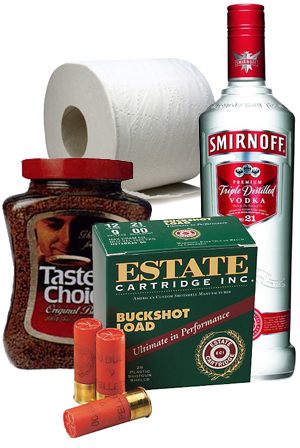 No, I'm not going to suggest that you stock up on Budweiser beer. It's too bulky and, well, it's terrible (in my opinion) -- especially served warm. Remember that beer is just an alcohol delivery system. For people who need a drink, simple vodka is the best bet. It provides the alcohol that people want plus it can be used for other things, like fuel and as a disinfectant. People who have "been there and done that" tell me that pints are the best unit to stock.
No, I'm not going to suggest that you stock up on Budweiser beer. It's too bulky and, well, it's terrible (in my opinion) -- especially served warm. Remember that beer is just an alcohol delivery system. For people who need a drink, simple vodka is the best bet. It provides the alcohol that people want plus it can be used for other things, like fuel and as a disinfectant. People who have "been there and done that" tell me that pints are the best unit to stock.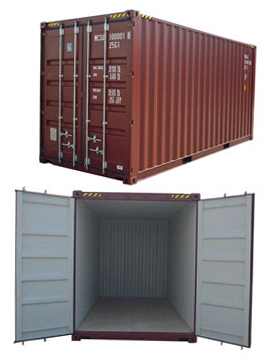 If you have a house full of goodies then it is just a matter of time before some roaming group of needy people will challenge your security and try to relieve you of some or all of it. Plan ahead and store your booty in many different and secret places. Don't do your bartering where your customers can see where you keep your goods. Use common sense and only display the items you intend to sell or barter at any one time.
If you have a house full of goodies then it is just a matter of time before some roaming group of needy people will challenge your security and try to relieve you of some or all of it. Plan ahead and store your booty in many different and secret places. Don't do your bartering where your customers can see where you keep your goods. Use common sense and only display the items you intend to sell or barter at any one time.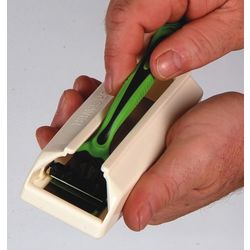 Hi,
Hi,